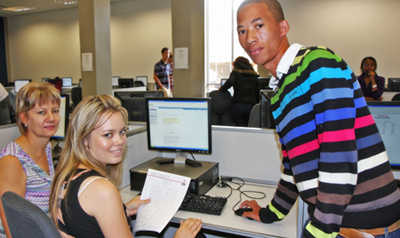 |
Ms Belinda Venter and her daughter, Stacey Venter, second year student in Consumer Sciences, registering online with the help of Donovan Nell, student assistant and currently a third-year student in Computer Sciences at the UFS.
- Photo: Leonie Bolleurs |
The university implemented an online registrations process for senior students this year. “We are one of the first universities in the country where students can do the entire registration process online themselves. The advantage of this new turn in the registration process at the university is that students can register from the comfort of their homes or even from any place in the world,” says Prof. Niel Viljoen, Vice-Rector: Operations at the UFS.
Senior students who experienced problems during the registration programme from 1 November 2010 to 4 January 2011, have the opportunity to, within a programme, address these problems as from 5-12 January 2011. During this period UFS staff members will be available to assist students to register electronically.
However, senior students can still register online after 12 January until 28 January 2011.
The registration process of first-time entering first-year students is also proceeding well. Although a large number of applications for late registration have been received, it can be handled without difficulty.
First-year students are welcomed by Prof. Jonathan Jansen, Vice-Chancellor and Rector of the UFS, on Friday, 14 January and Saturday 15 January 2011 at 09:00 in the Callie Human Centre.
From 17- 21 January 2011, first-year students will receive academic advice at the Callie Human Centre, where after they will be referred for self-registration. These processes will take place according to the scheduled timetable, which appears in the Kovsie Guide. The Kovsie Guide was sent to first-year students, and is also available on the UFS webpage (www.ufs.ac.za/register2011).
The registration process for the Qwaqwa Campus is from 17-21 January 2011 for first-time entering first-year students and from 17-28 January 2011 for senior students.
According to personnel at the registration help desk, the following problems are reported the most frequently:
- Forgotten or expired passwords: Students are requested to contact 051 401 2442 to report this problem.
- Outstanding registration fees, which lead to the specific student’s account being blocked: Students are requested to contact 051 401 2806 for help in this regard.
- If information regarding module codes is required, the relevant faculty can be visited for academic advice.
Classes on the Main and Qwaqwa Campuses will start on Monday, 24 January 2011.
Media Release
11 January 2011
Issued by: Lacea Loader
Director: Strategic Communication (actg)
Tel: 051 401 2584
Cell: 083 645 2454
E-mail: news@ufs.ac.za